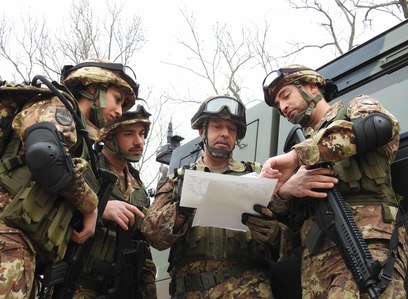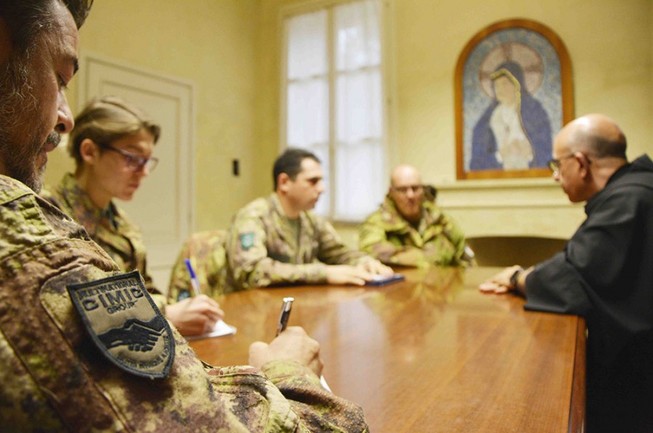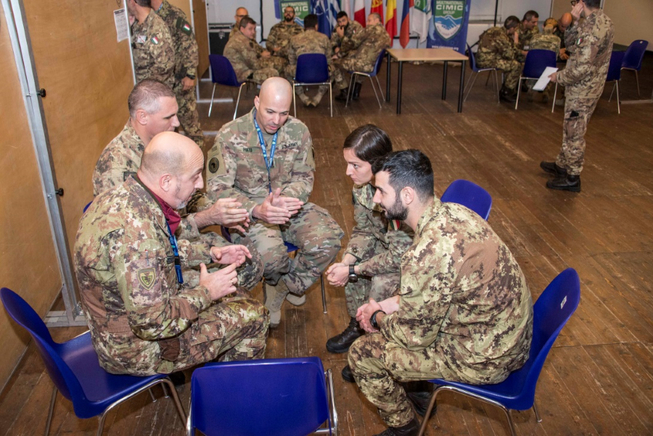NATO CIMIC FIELD & STAFF WORKER COURSE 1/2021
The NCFWC is conducted in parallel with the NATO CIMIC Staff Worker Course (NCSWC). Prior to the course, students are to attend on-line an initial ADL warm-up module (M1.2). Then, during the first residential week, Field Worker & Staff Worker students will jointly attend a common phase based on classroom lectures and syndicate work (M2.2). The third and final stage is the 2nd residential week, focused on field training experiences/lessons learned followed by a 3 days field training exercise based on a complex crisis in a failed State (M3). NCFWC is an evolution of the previous NCBC and tailored to the requirements of NATO and UN Crises Response Operations, Peace Keeping and modern operational environments. NCFWC provides students the opportunity to increase their CIMIC knowledge and practical skills through Syndicate work as well as better experience the CIMIC operator’s job at tactical level from a field perspective.
- Teacher: Domenico Centrone
- Teacher: Antonella Gelsomino
- Teacher: Antonella Gelsomino
CIMIC Functional Specialist Course 1/2021

The aim of the course is to provide the Functional Specialist (FS) (*) with a basic understanding of principles, tasks, functions and organization of CIMIC in NATO and of his/herwork as a FS within the military framework. To enable the FS to fulfill his/her special duty as an element of NATO CIMIC Assets. To create awareness for those civil organizations and individuals who have a vested interest in CIMIC activities.
- Teacher: Domenico Centrone
CIMIC LIAISON eLearning COURSE 1/2020
MAIN PURPOSE OF THE CLC IS TO COVER COMMUNICATION AND NEGOTIATION SKILLS THAT WILL STRENGTHEN STUDENT’S ABILITIES TO MEET THE CHALLENGES OF A CIMIC LIAISON OFFICER.
Course
is designed to provide former NATO CIMIC course’s students with
knowledge, skills and tools needed to enhance their CIMIC Liaison
capabilities with special reference to multinational and
multidimensional contexts which characterize current NATO’s Theatres of
Operations.
Course content includes CIMIC Liaison Officer’s profile, task and responsibilities, CIMIC Liaison field experiences, Cross Cultural Competence, Civilian environment assessment, Common operational picture.
Intercultural Communication & Negotiation are the core elements of competence and incorporated as guiding threads in the overall course curricula.
Senior Instructor: OF2 Salvatore DIGESU'
Course Director: OF3 Carmine CIACCIA
- Teacher: paolo caruso
NATO CIMIC FIELD & STAFF WORKER COURSE 2/2020
 The NCFWC is conducted in parallel with the NATO CIMIC Staff Worker
Course (NCSWC). Prior to the course, students are to attend on-line an
initial ADL warm-up module (M1.2). Then, during the first residential
week, Field Worker & Staff Worker students will jointly attend a
common phase based on classroom lectures and syndicate work (M2.2). The
third and final stage is the 2nd residential week, focused on field
training experiences/lessons learned followed by a 3 days field training
exercise based on a complex crisis in a failed State (M3). NCFWC is an
evolution of the previous NCBC and tailored to the requirements of NATO
and UN Crises Response Operations, Peace Keeping and modern operational
environments. NCFWC provides students the opportunity to increase their
CIMIC knowledge and practical skills through Syndicate work as well as
better experience the CIMIC operator’s job at tactical level from a
field perspective.
The NCFWC is conducted in parallel with the NATO CIMIC Staff Worker
Course (NCSWC). Prior to the course, students are to attend on-line an
initial ADL warm-up module (M1.2). Then, during the first residential
week, Field Worker & Staff Worker students will jointly attend a
common phase based on classroom lectures and syndicate work (M2.2). The
third and final stage is the 2nd residential week, focused on field
training experiences/lessons learned followed by a 3 days field training
exercise based on a complex crisis in a failed State (M3). NCFWC is an
evolution of the previous NCBC and tailored to the requirements of NATO
and UN Crises Response Operations, Peace Keeping and modern operational
environments. NCFWC provides students the opportunity to increase their
CIMIC knowledge and practical skills through Syndicate work as well as
better experience the CIMIC operator’s job at tactical level from a
field perspective.
- Teacher: paolo caruso
NATO CIMIC FIELD & STAFF WORKER COURSE 1/2020
The NCFWC is conducted in parallel with the NATO CIMIC Staff Worker Course (NCSWC). Prior to the course, students are to attend on-line an initial ADL warm-up module (M1.2). Then, during the first residential week, Field Worker & Staff Worker students will jointly attend a common phase based on classroom lectures and syndicate work (M2.2). The third and final stage is the 2nd residential week, focused on field training experiences/lessons learned followed by a 3 days field training exercise based on a complex crisis in a failed State (M3). NCFWC is an evolution of the previous NCBC and tailored to the requirements of NATO and UN Crises Response Operations, Peace Keeping and modern operational environments. NCFWC provides students the opportunity to increase their CIMIC knowledge and practical skills through Syndicate work as well as better experience the CIMIC operator’s job at tactical level from a field perspective.
- Teacher: paolo caruso
cimic tactical operator E-learning Course 1/2020

- Teacher: paolo caruso
Botton Line Up Front
Current NATO/UN/EU operations call for a comprehensive engagement strategy that is essential to develop community trust and create the cooperative enviroment necessary to achieve mission objectives. To deal with challenges originated mainly in Afghanistan, (present NATO's major Theatre of Operations but this is also applicable to any stability ops or under any aegis), Female Engagement Teams (FETs) were established. FETs are battle field enablers who listen, inform and interact with the local population, primarily women, to build enduring trust, confidence and increased support towards Host Nation Government and Multinational Force. In response of the new challenges identified, MNCG participating Nation appointed CJ7 Branch to design and conduct a specific course nominated "MNCG Female Engagement Teams (FETs) Course". This edition of the course applies to any operation and covers the main topics which are deemed necessary from the experience in the fied.
Aim of the Course
The FET Course is primarily designed to train the appointed Female Engagement Teams (FETs) operating at Tactical level. This edition enables NATO Officers/NCO to conduct FET activities at tactical level interacting with local female population in support of mission objectives.
The secondary aim is to inform and train civilian attendees with a parallel interest for the Theatre of operations with a special focus on the comprehensive engagement strategy of the local population, primarily women and children.
- Tutor: Rana El Khawand
- Tutor: Paulo Gomes
- Tutor: Achille Sollazzo
- Tutor: Anna Vanzan
CIMIC TACTICAL OPERATOR (BLENDED) COURSE 1/2021
The CTOC integrates the CIMIC Educational & Training landscape
and it is aimed to enable selected and suitable participants to operate
within a non-permissive and complex operational environment across the
CIMIC domain. Graduates from the CTOC are awarded with a professional
development skill identifier and the title of "CIMIC Tactical Operator
Specialist". CTOC provides students the opportunity to increase their
CIMIC knowledge and practical skills through Syndicate work as well as
better experience the CIMIC Tactical Operator Specialist’s job at
tactical level from a field perspective. Moreover, during the course,
the students will enhance a thoughtful understanding of human behavior
and an appreciation for mission oriented cultures and religions.
Additional skills required to develop throughout the course include the
capability to quickly provide an appreciation of the civilian operating
environment in order to support the commander at tactical level and
enhance his understanding of the social terrain in the operational area.
- Teacher: Domenico Centrone
